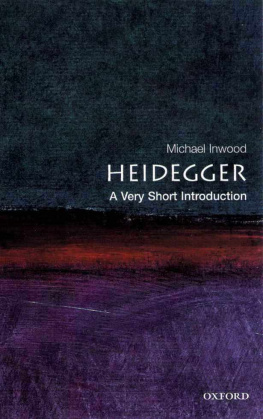Peter Trawny - Heidegger: A Critical Introduction
Here you can read online Peter Trawny - Heidegger: A Critical Introduction full text of the book (entire story) in english for free. Download pdf and epub, get meaning, cover and reviews about this ebook. year: 2019, publisher: Polity, genre: Religion. Description of the work, (preface) as well as reviews are available. Best literature library LitArk.com created for fans of good reading and offers a wide selection of genres:
Romance novel
Science fiction
Adventure
Detective
Science
History
Home and family
Prose
Art
Politics
Computer
Non-fiction
Religion
Business
Children
Humor
Choose a favorite category and find really read worthwhile books. Enjoy immersion in the world of imagination, feel the emotions of the characters or learn something new for yourself, make an fascinating discovery.
- Book:Heidegger: A Critical Introduction
- Author:
- Publisher:Polity
- Genre:
- Year:2019
- Rating:3 / 5
- Favourites:Add to favourites
- Your mark:
- 60
- 1
- 2
- 3
- 4
- 5
Heidegger: A Critical Introduction: summary, description and annotation
We offer to read an annotation, description, summary or preface (depends on what the author of the book "Heidegger: A Critical Introduction" wrote himself). If you haven't found the necessary information about the book — write in the comments, we will try to find it.
Heidegger: A Critical Introduction — read online for free the complete book (whole text) full work
Below is the text of the book, divided by pages. System saving the place of the last page read, allows you to conveniently read the book "Heidegger: A Critical Introduction" online for free, without having to search again every time where you left off. Put a bookmark, and you can go to the page where you finished reading at any time.
Font size:
Interval:
Bookmark:
Peter Trawny
Translated by Rodrigo Therezo
polity
First published in German as Martin Heidegger. Eine kritische Einfhrung Vittorio Klostermann GmbH, Frankfurt am Main, 2016
This English edition Polity Press, 2019
The translation of this work was funded by Geisteswissenschaften International Translation Funding for Work in the Humanities and Social Sciences from Germany, a joint initiative of the Fritz Thyssen Foundation, the German Federal Foreign Office, the collecting society VG WORT and the Brsenverein des Deutschen Buchhandels (German Publishers & Booksellers Association).
Polity Press
65 Bridge Street
Cambridge CB2 1UR, UK
Polity Press
101 Station Landing
Suite 300
Medford, MA 02155, USA
All rights reserved. Except for the quotation of short passages for the purpose of criticism and review, no part of this publication may be reproduced, stored in a retrieval system or transmitted, in any form or by any means, electronic, mechanical, photocopying, recording or otherwise, without the prior permission of the publisher.
ISBN-13: 978-1-5095-2175-3
ISBN-13: 978-1-5095-2176-0 (pb)
A catalogue record for this book is available from the British Library.
Library of Congress Cataloging-in-Publication Data
Names: Trawny, Peter, 1964- author.
Title: Heidegger : a critical introduction / Peter Trawny.
Other titles: Martin Heidegger. English
Description: Cambridge ; Medford, MA : Polity, [2018] | English translation of: Martin Heidegger : eine kritische Einfhrung. | Includes bibliographical references and index.
Identifiers: LCCN 2018024450 (print) | LCCN 2018034840 (ebook) | ISBN 9781509521791 (Epub) | ISBN 9781509521753 | ISBN 9781509521753q(hardback) | ISBN 9781509521760q(paperback)
Subjects: LCSH: Heidegger, Martin, 1889-1976.
Classification: LCC B3279.H49 (ebook) | LCC B3279.H49 T64513 2018 (print) | DDC 193dc23
LC record available at https://lccn.loc.gov/2018024450
Typeset in 10.5 on 12pt Sabon by Toppan Best-set Premedia Limited
Printed and bound in the UK by CPI Group (UK) Ltd, Croydon
The publisher has used its best endeavours to ensure that the URLs for external websites referred to in this book are correct and active at the time of going to press. However, the publisher has no responsibility for the websites and can make no guarantee that a site will remain live or that the content is or will remain appropriate.
Every effort has been made to trace all copyright holders, but if any have been overlooked the publisher will be pleased to include any necessary credits in any subsequent reprint or edition.
For further information on Polity, visit our website:
politybooks.com
Preface to the English Edition
it is now my Critical Introduction to Heidegger's thought that is here translated into English.
Since the publication of the Black Notebooks and the intense controversy that their anti-Semitic statements provoked in Europe, the discussion of Heidegger's thought has been inscribed in a political context. The willingness to read the master of soil and rootedness in a critical manner has given rise to a fiercely defensive attitude from supporters of the nation and Christianity. One wants to protect the master: we had already forgiven him for a bit of anti-Semitism before he made himself even more explicit on this point.
At the other end of the spectrum, we find judges who seem to have been personally appointed by morality itself and who wish to purify the academy of all evil as if the very idea of purification were not itself affected by this evil. These warriors for peace want the best of all possible worlds. In such a world, Heidegger's thought still has a place only as an example of evil.
In the antagonism between immediate supporter and immediate critic, it is not difficult to recognize the major political tendencies of our age. It concerns the darkest circle of racists as well as the most enlightened advocates of gender theory: the more the former deeply hates the other, the more the latter wants universal respect for the other. The severity of one's own position is derived from the severity of the other side's position. We must interpret the current political debates in a dialectical manner.
Both sides consider my own position to be untenable. To recognize problems in Heidegger's thought, without wishing to extricate this thought from the history of philosophy, seems to be inconsequential. What is more, whoever still considers this thought to be a vital source for philosophizing in our day and age will immediately be seen as an accomplice of the condemned.
The Experience of Thinking Itself: this is perhaps the title under which I would like to unfold what I have to say about Heidegger's philosophy in my Introduction. A world trapped in its own immaterial webs is in need of this experience.
Peter Trawny
Berlin, February 15, 2018
Introduction
Friedrich Nietzsche
The use of the plural paths indicates that his thinking does not know a unique path that would culminate in an oeuvre.
In this understanding of philosophy, it is not at all certain that these paths will lead to truth. On the contrary, a philosophy that is on the way can go astray.
On the other hand, Heidegger is massively rejected by many critics. Ultimately, this rejection does not hinge on Heidegger's irremediable error of getting lost in National Socialism.
In early 2014, the publication of a number of these notebook entries caused an earthquake in the reception of Heidegger's thought. Though it had long been known that Heidegger decided to become involved with National Socialism in the early 1930s, no one knew that he had also, sporadically and privately, accorded philosophical importance to anti-Semitism. This is precisely what the entries of the Black Notebooks from 193848 attest.
Therefore, an introduction to Martin Heidegger's philosophy necessarily introduces us to his anti-Semitism. Wouldn't it be better, then, not to write such an introduction at all? Instead, shouldn't we be advising others against such a philosophy? Shouldn't we banish it into history's poison cabinet? Should access to it be granted only to those who are educated enough to recognize its errors?
As concerns the core of the anti-Semitic statements that surface in Heidegger's thinking, we must present them in a clear and lucid manner. In a certain way, this presentation will already be an interpretation that we must likewise underscore in a particular manner. This interpretation will focus on Heidegger's notebook entries concerning the Jews entries that are, in many regards, highly problematic and absurd (Abwegige). As opposed to other interpreters, my view is not that Heidegger's entire thinking is to be characterized as anti-Semitic. I have thoroughly revised my 2003 introduction because I could no longer leave it as written after coming to know the Black Notebooks.
Heidegger's thinking is anything but moderate. The philosopher is familiar with extremes and does not mince words: he takes what is most extreme as the norm and has no desire to think any differently. Time and again, not only does he thematize the decisions and ruptures, the profound caesuras and horrors of existence, but also that which heals, with which every life is acquainted. And is it not the case that wars and genocides have affected life in an extreme way during the two halves of the twentieth century? Yes, certainly: for philosophers men and women the singularity of the twentieth century lies in the fact that they must necessarily respond to its events, the two world wars, the Shoah, the revolutions. There is no other century in European history whose catastrophes have gripped philosophy in such an ineluctable way. Heidegger's thinking, too, takes a stance vis--vis the catastrophes of that century and has thus become a kind of manifestation of this period.
Font size:
Interval:
Bookmark:
Similar books «Heidegger: A Critical Introduction»
Look at similar books to Heidegger: A Critical Introduction. We have selected literature similar in name and meaning in the hope of providing readers with more options to find new, interesting, not yet read works.
Discussion, reviews of the book Heidegger: A Critical Introduction and just readers' own opinions. Leave your comments, write what you think about the work, its meaning or the main characters. Specify what exactly you liked and what you didn't like, and why you think so.









